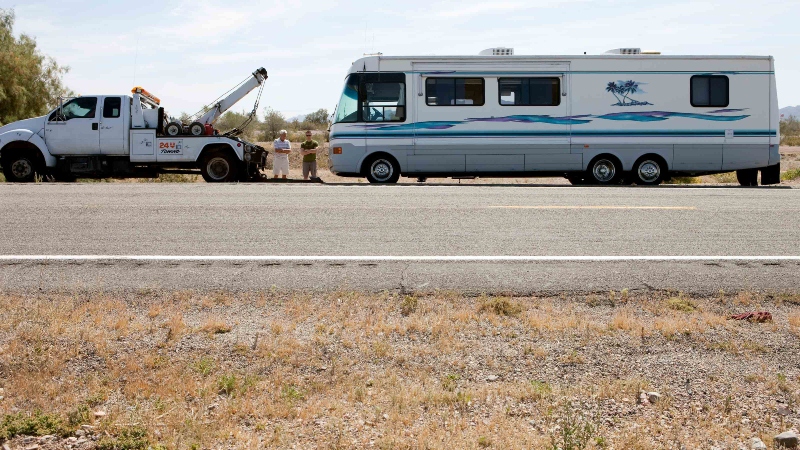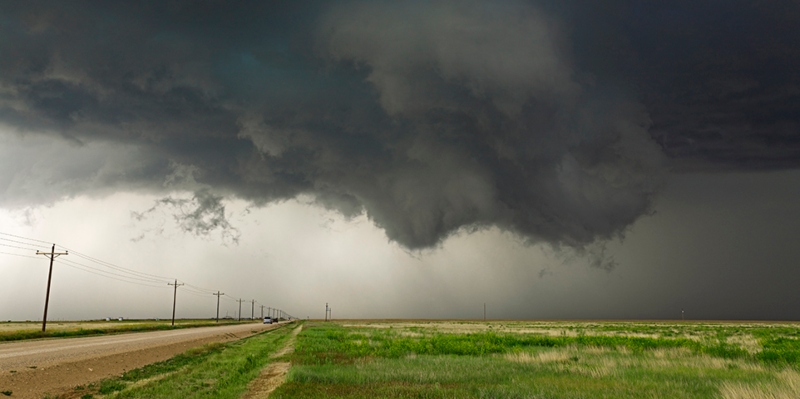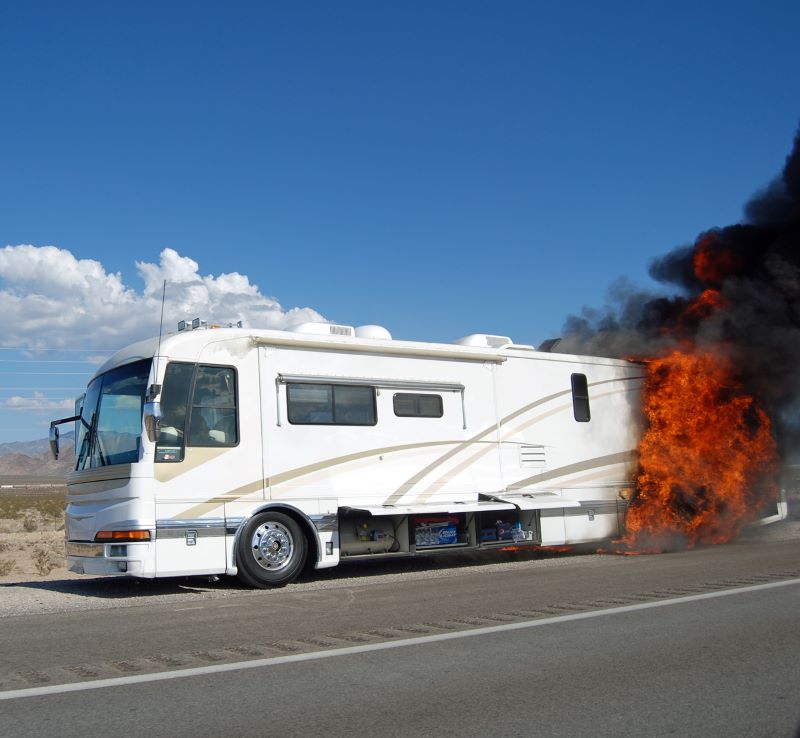Thanks for your support! If you make a purchase using our links in this article, we may make a commission. And, as an Amazon Associate, I earn from qualifying purchases. See the full disclosure here.
If you’re familiar with the ins and outs of other types of insurance coverage, you probably understand some of the basics of what RV insurance covers. With motorhomes and travel trailers, it’s like combining home insurance and auto insurance into a neat package.
Yet, with any type of insurance product, never assume you know what types of damage RV insurance covers and what it won’t. Whether it’s a Gulf Coast hurricane, highway incident, or campground mishap, you need to know what RV insurance will cover and what your responsibilities are to avoid any surprises if the worst-case scenario happens.
Join us as we explore what RV insurance covers and what you should expect.
Is it a Good Idea to Get RV Insurance?

It almost goes without saying that getting RV insurance is always a good idea. Even the smallest, 2-person or solo teardrop is very costly and, without insurance, is a complete loss if you’re ever in an accident. Auto insurance coverage extends to utility trailers you’re pulling but won’t fully cover everything inside and out of a teardrop or a massive fifth wheel.
However, only in terms of liability can home insurance extend to the belongings outside your house. But it’s generally inadequate to cover your travel trailer appropriately.
When it comes to drivable motorhomes, RV insurance coverage is a must. For one, the state you live in will require minimum liability, but Class A, B, and C motorhomes are just too expensive to risk not having them insured beyond liability.
Is RV Insurance the Same as Auto Insurance
Outside of the shared liability coverage or extensions from home insurance policies, RV insurance and auto insurance are not the same. Fortunately, auto, home, and RV insurance policies share enough similarities that it’s not as irritatingly complex as you might think.
In fact, many insurance companies won’t allow RV owners to simply add their RV to their auto insurance policies. It requires a separate and distinct policy altogether. A standard RV insurance policy sounds a lot like an auto policy and includes many of the same things.
- Liability coverage
- Comprehensive coverage
- Collision coverage
- Uninsured motorist
- Underinsured motorist
- Personal property
- Roadside assistance
All of this sounds pretty familiar, right? The only time things can get a little complicated is when you are building out your own campervan or teardrop. It’s only complicated because you need to record the items that go into the build for underwriting purposes down the road.
The other side of RV insurance coverage is a lot like homeowners insurance. When you are parked on a campsite, your insurance covers the living quarters of the RV and the outside area that makes up the rest of your campsite. The campground’s insurance only covers public areas and campsites not being used.
So if someone were to get injured on the campsite you occupied at the time, you’re liable, not the campground. That’s why it’s a good idea to clear or mark tripping hazards on your campsite.
10 Types of Damage RV Insurance Cover
RV insurance is about as comprehensive as any other type of insurance and covers everything you would expect.
1. Does RV Insurance Cover Water Damage?
Comprehensive coverage takes care of water damage, whether from a leak inside the RV or flood damage, the latter of which is not covered in standard home insurance policies. Of course, if the damage is intentional or due to negligence, that changes things.
2. Does RV Insurance Cover Awning Damage?
For the most part, yes. How it’s covered depends on the insurance company. The awning may fall under comprehensive or collision. It may fall under its own category. It’s always a good idea to read the fine print.
3. Does RV Insurance Cover Delamination?
For the most part, no. Delamination is considered to be “normal wear and tear” since its mostly caused by exposure to the elements over time.
4. Does RV Insurance Cover Natural Disasters?

This is where specificity matters. Comprehensive coverage will cover damage from natural disasters, but your interior belongings are another matter. Contents coverage is necessary for that, and you have to get specific as the policy is written.
5. Does RV Insurance Cover Roof Leaks?
Comprehensive coverage will cover roof leaks, but only if the leak is caused by a covered incident. Wear and tear leaks, manufacturer deficiencies, and negligence don’t count.
6. Does RV Insurance Cover Rodent Damage?
In some cases, comprehensive will cover rodent damage, but it may be an add-on feature. You need to be alert on this one because that’s not always the case. Since rodent damage is common with RVers, make sure it’s covered under the comprehensive portion of your policy.
7. Does My Insurance Cover an RV Rental?
Almost no auto and home insurance offers RV rental coverage. Many peer-to-peer RV rental companies use third-party insurance companies or are big enough to offer RV rental insurance themselves. The advantage is that they can bundle the cost into the rental agreement.
8. Does RV Insurance Cover Road Accidents?
RV insurance covers road accidents for the RV, while your tow vehicle is covered by auto insurance. Motorhomes are wholly covered by RV insurance.
9. Does RV Insurance Cover Passengers?
Like auto and homeowners insurance, RV insurance covers everyone with you. That includes uninsured and underinsured motorists, medical, and all of the other coverages in the policy.
10. Does RV Insurance Cover Theft?
Comprehensive coverage covers more than just natural disasters, falling trees, and hail storms. It also covers your RV from theft and fire.
What are the Best RV Insurance Companies?
Keeping your RV insured is necessary, especially if it’s a beloved vacation home or you live in it full-time. You don’t want some corner store insurance policy that’s questionable in the best of times.
Best Overall- Roamly
When it comes to flexibility, it’s difficult to argue with Roamly. Where most insurance companies are mega-corporations that cover a wide range of policies, Roamly was founded by RV enthusiasts. They understand the lifestyle and insurance needs better than anyone.
Roamly covers the whole gamut, including DIY teardrops and campervans, something some insurance companies avoid.
Good Value- Geico

Since RVs are considered specialty vehicles, your motorhome or travel trailer needs coverage that fits its needs. Geico will tailor a policy that fits your state minimums, your specific needs, at the best premium possible. This RV insurer has built a solid reputation over the years and offers great coverage, support, and options for all RVs.
Good Customer Service – Good Sam
Good Sam is renowned for its customer service and the wide range of coverages they offer. Like Roamly, they also cover DIY RVs, which is often difficult to find with high-profile insurance companies. Customer support is 24/7, with excellent roadside assistance services and a wide range of optional add-ons.
Good for Competitive Rates – Progressive
Progressive is as good with RVs as they are with homes, autos, motorcycles, and boats. In fact, Progressive is a good choice when you want to bundle everything together because their rates are exceptional.
Good for Full-Timers – National General
National General is second only to Good Sam in customer service appeal. They’re one of the largest insurers in the U.S. and have been operating since the early 1920s. They know their business and are an excellent choice for full-time RVers, especially if full-timers take advantage of National General’s SmartDiscounts.
PRO TIP
6 FAQs About RV Insurance Coverage
1. How much should I insure my RV for?
So many factors go into the exact amount an RV should be insured for that it’s difficult to answer with a single, accurate solution. How often you use your RV, its age, where you spend most of your time, what you have in it, your specific concerns, your bank statement, and more are all considerations.
Mainly, you want to protect yourself and yours. Your coverage should reflect that. Everything else is secondary, wholly dependent on both state law and your interests.
2. How much does RV insurance cost?
On average, RV insurance premiums (throughout the U.S.) run between $500 and $3,000. However, it can get more expensive, depending on the coverage and the RV. Luxury Class A motorhomes are generally the most expensive.
3. What Affects the Cost of RV Insurance?
Some factors that affect RV insurance costs make sense, and others may surprise you. It’s always important to remember that insurance costs are almost wholly based on statistics, with market factors secondary.
- Type of RV
- You zip code
- Age of RV
- Condition of the RV
- How much do you use it (full-time, part-time, weekender use)
- Your driving experience
- Number of claims you’ve filed in the past
- Your record
- Your credit
- The coverage you select
4. How do RV insurance claims work?
The general process is as follows:
- Call your insurance provider and submit a claim
- Work over coverage details with a claims expert
- Claims expert schedules an inspection
- Claims expert gives you an estimate after the inspection
- Schedule a time and date for the repair
- Pay your deductible
- Repairs are made
5. Will making a claim on your RV insurance raise your rates?
Not necessarily, but it’s entirely possible, especially if the claim is filed when you are at fault in states that don’t have “no-fault” laws. However, if you’re not at fault, you may not see an increase in your premium.
6. Will My RV Insurance Cover My RV if I Rent It Out?
In most cases, your RV insurance through companies like Geico or Progressive will not cover your RV if you choose to rent it out to make a few extra bucks while you aren’t using your RV.
PRO TIP
Final Thoughts on What RV Insurance Covers
If you’re a new RV owner and this is your first motorhome or travel trailer, it’s easy to assume you don’t need that much coverage. While that’s understandable, it’s also not the best idea. RVs are not cheap, and repairing them can be costly.
Even when you’re constructing your teardrop or converting a campervan, it’s important to track and make note of everything that goes into it, down to the smallest component. You do that for future negotiations over coverage so the insurance company can determine the real value, and you can cover what’s important to you.
The last position you want to be in is with liability insurance only as you stare at a severely damaged, burned, or robbed motorhome. Yes, it can be an irritating added expense. But think of it as investing in yourself, your family, and your future as an RVer.
Related Reading:
1. Does Insurance Cover RV Windshield Replacement?
2. How Much Does RV Insurance Cost?
3. The Wrong RV Rental Insurance Leaves You Exposed
4. How to Check for RV and Travel Trailer Recalls
Thomas Godwin – Author and Part-Time RVer
Thomas Godwin is a full-time freelance writer with a BFA in Creative Writing, a U.S. Marine, and an avid outdoorsman.
Thomas’s love for RVing began at an early age spending time camping in the family vintage Airstream.
His background and education in writing, combined with his passion for the outdoors, can be seen in publications such as Camper Smarts and Vanlifers, as well as multiple animal and outdoor recreational publications.
When he’s not writing, he’s raising chickens and Appleyard ducks. Thomas also constructs teardrop campers (attempting to anyway) and kayaks the Blackwater River with his wife, two daughters, and his Dobermans.



I’m insurance poor so the article was definitely helpful. New to travel trailer world, bought for mother to live in next to our home. Never had a chance to use, passed shortly after I had 34 feet of custom ramp built for her walker. Weeks for delivery of material. We have pulled horse trailers for years and a horse trailer is rather inexpensive. We intend to try to use the travel trailer, but life is busy @75 we still work in our business and maintain rental property as well. I have learned as much as possible watching and, listening to you both for a year or so. Your very good at explaining what we should know, the do’s and don’t. I will share something. My husband works motion pictures and on all productions we have motor homes and trailers, for the staff, actors make-up and hairdressers wardrobe etc. they are always breaking down!!!! So 50 years of productions, my husband isn’t so excited about the travel trailer,I laugh, so I’m the one going to work the propane grey tank black tank you name it’s my job. Hubby will drive then watch t.v. after were parked unless they have a gym!! Thank you for the insurance info, I also take care of that, enjoy all the hrs. listening to you both. I’m ready for another adventure. Jo
Great article – thanks
Thanks George